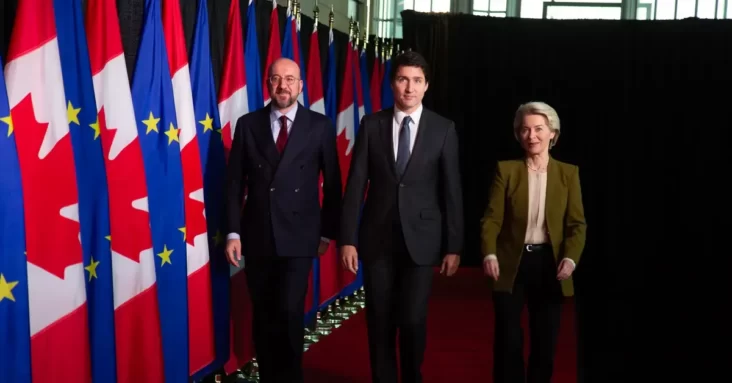
Prime Minister Justin Trudeau has announced the launch of a digital partnership with the European Union to promote the interoperable use of digital credentials, counter disinformation, and cooperate on artificial intelligence (AI).
Details about the partnership were released Nov. 24 after Mr. Trudeau met with EU Commission President Ursula von der Leyen and EU Council President Charles Michel in St. John’s, Newfoundland, for a leaders’ summit.
Before the official announcement, Mr. Trudeau said Nov. 23 that the partnership would make a “huge difference” as Canada and the EU “work together to understand the impacts of AI, the impacts of disinformation and misinformation on the social media that people get overwhelmed by in so many ways that tend to exacerbate our challenges.”
As part of the partnership, Canada and the EU will share information on their respective digital identity and digital credentials and “develop concrete pilot projects towards their interoperability.”
The partnership will pave the way for their eventual mutual recognition. “Both sides could cooperate in international standard setting to support the development of human-centric digital identity and digital credentials,” according to the agreement.
Canada has been involved in at least three digital credentials projects, two of which are initiatives of the World Economic Forum (WEF).
The digital partnership with the EU also seeks to tackle “foreign information manipulation and disinformation” by enhancing cooperation.
The different areas of potential cooperation noted include “knowledge mobilization, digital media and science literacy, building trust in government communications and institutions, programmatic approaches, and exchanges between researchers and academics of the two jurisdictions.”
The Liberal government has been focused in recent years on efforts to stamp out what it calls “misinformation” and “disinformation,” by enacting legislation like Bill C-18 to support legacy media organizations or preparing a bill to target “online harms.”
They also identified disinformation as “one of the most pressing and harmful forms of malicious behaviour online,” while at the same time cautioning that the government should not be deciding what is true or false.



